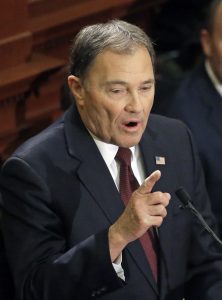
Gov. Gary Herbert urged lawmakers and Utahns alike to look to the future and “unlock unlimited possibilities through unprecedented partnerships” in his annual State of the State address on Jan. 24.
Herbert also expressed his optimism for the 2018 legislative session, spoke on the state’s new task force against teen suicide and mentioned the #MeToo movement.
Herbert began his address by briefly acknowledging Utah’s accomplishments and progress, citing over 500 bills passed during the 2017 legislative session and Utah’s rank in many national surveys.
“This year, my overall report is more optimistic than ever,” Herbert said.
For detailed information on Utah’s rankings, he asked listeners to visit utah.gov/stateofthestate.
Herbert said Utah could better itself for future generations through cooperation.
He spoke about the laws passed 101 years ago in the 1917 legislature, how the work of those lawmakers are remembered today and how current decisions will shape Utah 100 years from now.
In the 2018 legislative session, 1,277 bill files have been opened.
Herbert said despite this overwhelming number, lawmakers can still pass laws to make a difference for Utah today and in the future by prioritizing.
Herbert spoke about his granddaughter, who is currently serving an LDS mission in Melbourne, Australia, and the responsibility to create a Utah where she will have the opportunities she needs in her future.
Herbert spoke on Utah’s “unique spirit of collaboration,” both in the government and among citizens. He spoke about the great progress made in the Rio Grande neighborhood by government and community banding together, “shoulder-to-shoulder, no credit, no blame.”
Salt Lake City government workers have made efforts recently to better the Rio Grande neighborhood by meeting weekly with residents to discuss, plan and implement improvements. Recent improvements include new street lights, more police foot patrol to the area and neighborhood clean-up teams.
Herbert called for this collaboration again when he announced a task force to work with the Suicide Prevention Coalition against teen suicide.
Suicide has become the leading cause of death for young people in Utah, Herbert said. The new task force’s goal is to set a plan for community engagement to fight this issue by Feb. 15.
Herbert also spoke on the influence Matt Hillyard — the son of Alice Hillyard and Sen. Lyle Hillyard, R-Logan — had on him. Matt was born with down syndrome and recently passed away at the age of 42.
“Matt loved unconditionally,” Herbert said. “In Matt’s eyes, there were only winners, no losers.”
He urged lawmakers to take inspiration from Matt’s attitude during the coming legislative session and to look out rather than focusing on bruised egos or self-interest.
“If we do our job right today, Utah in the future will still be the greatest place to live, to love, to work and to serve,” Herbert said.
During the Democrat party’s response to the State of the State, Sen. Gene Davis, D-Salt Lake, and Rep. Brian King, D-Salt Lake, echoed Herbert’s call for collaboration while outlining their goals for educational funding and support for working families.
“We need to invest in our children and the infrastructure of education to make sure that our children are prepared for the future,” Davis said.
King said people come “first and foremost above jobs.” He discussed the importance of policies that support working families, such as a living wage and paid family leave. He said more needs to be done for families than simply talking about family values.
While acknowledging the progress Utah has made, King urged Utah not to get complacent.
“We can’t give up. We can’t go back,” King said. “We have to press on.”




